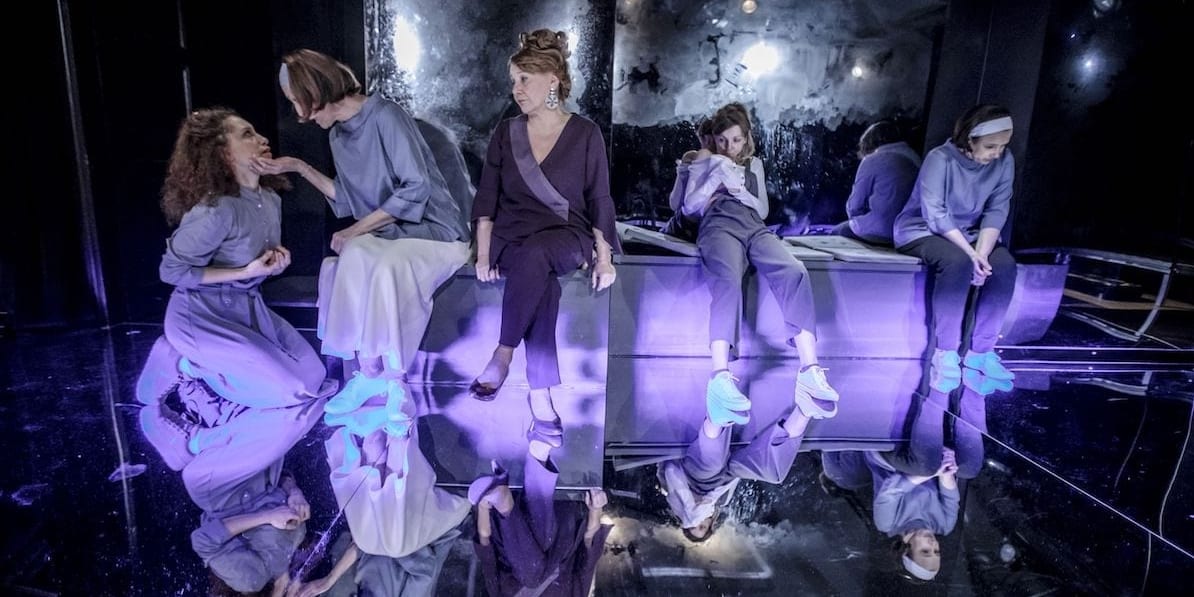Mikveh, a purpose-built ritual bath for the purpose of ritual immersion in water to achieve ritual purity. Orthodox Jewish women must immerse in the Mikveh after menstruation and childbirth before they can resume a full relationship with their husbands, namely, have sex.
Hadar Galron, familiar with Jewish Orthodoxy gives the audience more than a mere glimpse into the ultra-orthodox life. Set in a location where women fully undress to immerse, the eight female characters, in cleverly structured dialogues, unmask some of the upspoken secrets of the orthodox community.
In Israel, Mikveh was awarded, in 2005, the best play of the year. Two of the mikveh attendants – Szoszana. superbly performed by Ernestyna Winnicka, who believes in guarding the privacy of the women who come for their ritual immersions; and Szira (Ewa Tucholska), a younger one from an outside community who believes that in women’s solidarity and the need to share relevant information.
The two clash over what to do and say regarding Hadwa (Małgorzata Majewska), a female, whose naked body reveals she is clearly being physically abused by her husband, a powerful politician; and Tehila (Sylwia Najah) a 19 years old who is terrified of her wedding night with a groom she will only meet earlier in the day.
“This is a women’s mikveh, not a women’s shelter,” Szoszana rages – after Szira tries to provide Hadwa with resources for victims of domestic violence or a bit of rudimentary sexual education to Tehila.

The themes that run through the play raise issues that affect conservatives and patriarchal societies, such as equality, fear of breaching coded yet guarded rituals and rules. Kirsz,’s direction offers extraordinary sensitivity to the social aspect of the issues discussed. The female performers, there are no male actors in this play, create a travel machine that takes the audience on a journey to a location, though very familiar and crucially important to a certain social group, it is obscure and totally unfamiliar to many members of the audience
In the place of serenity, as the mikveh is a place to purify, Galron creates a platform filled with undercurrent fears and conflicts. Kirsz’s excellent direction explore these elements powerfully. The performance, by all participants, offers an uncomfortable yet gripping viewing. The unfolding stories told by Shira, brilliantly performed by Ewa Tucholska, Hindi (excellent Alina Świdowska) or Mikhaila (outstanding Monika Chrząstkowska) become as palpable as the towels that cover the women’s bodies and thus touches and stimulates the audience so strongly.
The space in the Jewish Theatre in Warsaw organised by Ewa Łaniecka constitutes a significant part of the performance.
The walls in the mikveh are covered with mirrors: symbolic doors to a higher sphere. Is it possible to create mutual understanding among women who are so different and so full of the power that men envy them so much? Will they be able to find an antidote in a situation with no way out? These and many more questions asked to the heroines of the drama, the actresses on stage and the audience hit us twice as strong. Especially in the moment when the performance is so much related to the current events taking place in the streets of many Polish cities and towns. The real magic of the theatre appears to consist not only in its ability to create different worlds but also in the currency of the ideas it conveys. That is why the Warsaw’s “Mikveh” is the play that will speak its truth, currency and wisdom to all the participants of the Black Umbrellas protests and Women’s Strike, regardless of their age. Facing the odds is our daily bread and searching for support and answers in art is one of the ways which help us remain full of hope.

